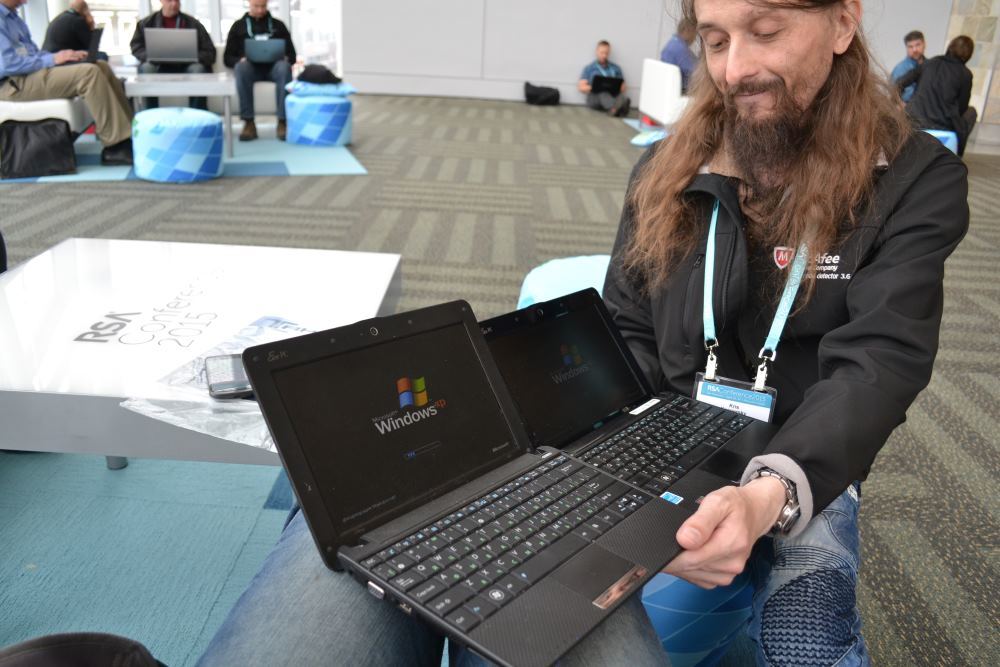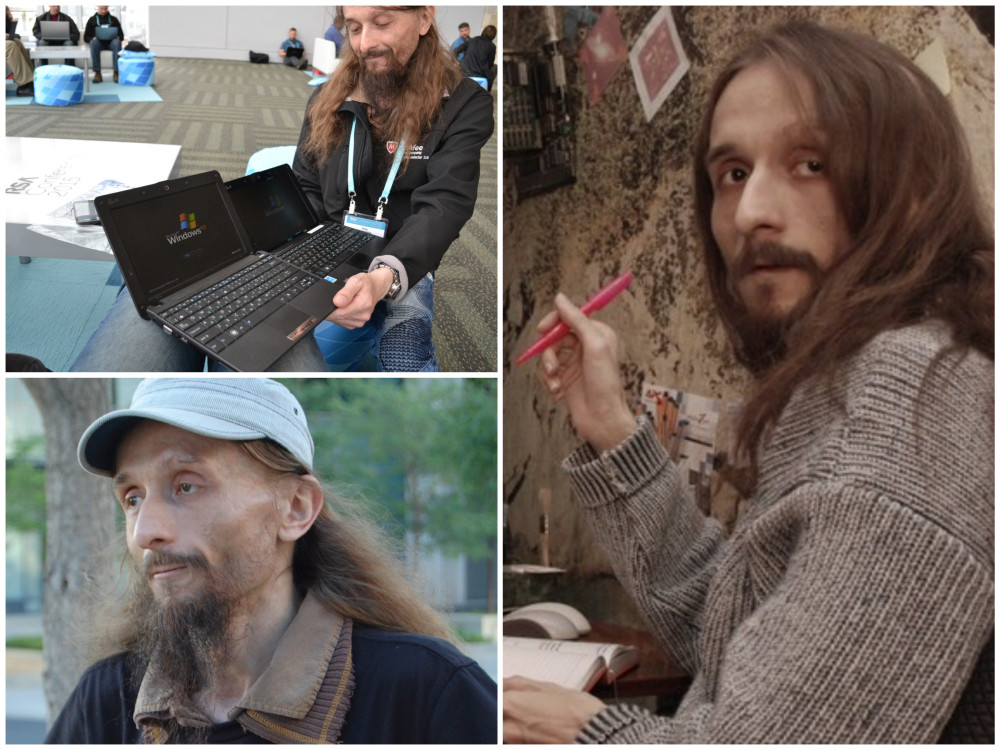Chris Kaspersky died. The memory of this hacker is dedicated

Chris Kaspersky at RSA Conference 2015. Source: hacker.ru
They say that there are no irreplaceable people. For the most part this is true, but there are exceptions. For example, if we talk about Nikolai Likhachev, whom the whole world knows like Chris Kaspersky, here the assertion of indispensability fails. In the IT field, this person has done a lot, as can be judged by the printed “legacy”: Kaspersky left behind more than 20 books and 500 articles . He was a real hacker, in the original sense of the word. That is, a person who perfectly understood how and what works in IT.
Actually, he began to study information technology very early - from primary school, immediately after the appearance of the first computer, which had the proud name Pravets 8D. In fact, this is a clone of the British computer Oric Atmos, and the instruction was in Bulgarian. Nevertheless, Chris (then Nikolai) quickly got used to everything, writing his first game. In it, the user had to catch the fish. Graphics were not here, its role was played by symbols. In the center of the screen was a fisherman in the form of a question mark, and the fish was displayed with a zero and a “more” sign. It was necessary to fish by pressing the space bar.
Becoming a specialist
Many owners of personal computers of the time, especially schoolchildren, used them to play. But there were those who studied programming, and on their own. That was the kind of man Nikolai Likhachev was. Having learned to create games for his Pravets 8D, he began to master the assembler. True, here in the learning process another PC was used, a more modern one - the BK-0010 Electronics. Then he consistently became the owner of the ZX Spectrum and "Agatha". According to Likhachev himself, he very poorly remembers dates, and he leads the chronology of events according to the models of computers that he had at different times.

Chris Kaspersky's workplace (Photo: Alexander Kulik)
He finished school with a silver medal, although there were no fours in the certificate. As a matter of fact, Likhachov himself was, if I may say so, consumer-oriented towards learning. If she did not bring knowledge and pleasure, then he quit studying. So it was in the case of training in the Taganrog University of Radio Engineering, with a specialty "Design of microcontrollers". Unable to bear it, Nikolai gave up his studies before reaching the first session. This is because, according to him, they really did not allow programming at this university. Then he went there again (at the request of the mother) and again dropped out. At about the same time, Nikolai Likhachev became the owner of an IBM PC with a 20 MB hard drive and a color monitor. After agreeing with a friend, he opens a cooperative that provides system administration services. After a while, the partner fails, steals money,
By the way, when he lived in his village, local criminal elements offered him to break into the computerized system of accounting for imported sugar beet at the local plant. It was “an offer you cannot refuse.” But everything worked out, nevertheless, it was possible to bring the idea to the crime that this hacking will not bring money, but you can get caught very quickly. To get rid of the insistent requests of the bandits turned out with the help of a friend Likhachev.

After that, Kaspersky (he already started using this pseudonym at that time) makes several more attempts to establish his own business, and also meets with Eugene Kaspersky. He even offered a couple of ideas for Laboratories, but there was no fruitful cooperation. Rather, nothing happened at all. About this moment in his life, Kaspersky says the following: “Once in Moscow, on the staircase, which served as a smoking room for employees, there was a historic and only meeting of two Kaspersky. Chris came to the anti-virus laboratory of Eugene Kaspersky, suggested a couple of ideas, but the cooperation did not work out: “I don’t know why, but as soon as the laboratory talks about me, their mood immediately deteriorates. Now they spread rumors that I had been working with them for three weeks, they took me for a laugh, and then they kicked me out. Now we are with Kaspersky in parallel planes, I do not interfere with his business, but he does not interfere with mine. I even deliberately removed the "nd" from the pseudonym so that we would not be confused. But he doesn't love me anyway. ”
By the way, the pseudonym Chris Kaspersky is not derived from the name of Evgeny Kaspersky, as is sometimes believed. He has nothing in common with a rat. Probably, the pseudonym appeared because of Likhachev's fascination with a cartoon about a ghost named Casper and Chris Kelmi . Another pseudonym, Mysh, appeared on the basis of the love for the novel Dune. One of the main characters bore the name Muad'Dib, which literally means "desert mouse." Likhachev created an analogue of this name in Russian.
He wrote the first article while still a schoolboy, although it did not concern programming or information security, but astronomy, another of Chris’s great passions.
In 1998, he began to actively participate in the life of Fido, mainly in the ehoconference RU.HACKER. Here he was noticed, after which he was offered to become an author of professional technical literature. In 1999 the publishing house Solon-Press published the first book of the author entitled “Technique and philosophy of hacker attacks”. According to the publishing staff, Kaspersky was a calm person who spoke and wrote very well. By 2008, 16 books by the author were published, including translations into English. Most of the work is devoted to information security and programming, there are books on astronomy. At one time, he was the editor of the Explore Review column for the Hacker magazine.
Until the end of the 2000s, he lived in his native village (Uspenskoye in the Krasnodar Territory). Then he received an offer from the American company Endeavor Security and began working for it. First, remotely, after some time he left for the USA and began to live and work there. He settled not in a large settlement, but in the town of Reston. True, this is not an ordinary town, there are offices of many technological giants. This, for example, Intel, Microsoft, Google, Symantec, PayPal, IBM, Dell, Juniper, Citrix and other companies. Chris received an O1 visa (for people with outstanding abilities). It is usually received by Nobel laureates, academicians and representatives of the IT-sphere (Linus Torvalds, for example).

Reston. Photo: Nova Virtual Tours and Polley Graphics
In 2009, Endeavor Security was taken over by McAfee, and Chris went to work there. In the new company, thanks to the recently written module for the anti-virus product McAfee, he was recognized as the best employee of the year. This module has helped professionals to find out the details of the attack against Google - “ Operation Aurora ”.
Kaspersky’s work activity in the USA was not particularly advertised by him. In many ways, because after one of the lengthy interviews that he occasionally gave, the FBI became interested in the work of a specialist. Computers and other equipment were seized. But then Chris Kaspersky managed to settle everything. “The story had a pleasant continuation and ended with an out-of-court settlement, paying compensation to me in the amount of a spherical programmer from the Russian Federation for several years, so this is not a loss, but solid gains,” he said in an interview with the Internet edition Dev.by.
After the incident with the FBI, Kaspersky began an even more secretive way of life than before. According to him, he regularly dumped all the important data on the hard disk, and in turn put it in the bank box.
What Kaspersky did in recent years is not known for certain. He himself talked about projects for the US military. He also wrote software for recognizing satellite photos, and this software was based on his earlier project of recognizing porn images and videos. And the principles of image recognition are similar, according to Kaspersky, with a number of mechanisms for the operation of anti-virus programs, in the event that “to think in abstract categories”. The basic principle is the search for what is in the sought-for elements and not on all the others.
Hobbies
Reading about Chris Kaspersky, you might think that this is a reticent person, a perfectionist and a bore. In fact, this is not at all the case, at least with regard to boredom. He himself divided his life into three parts. The first is the phase of isolation, when he worked in the house, living in the village, and where he went little. Then Kaspersky began to travel the world, getting the necessary contacts in his field, talking about what he was doing. During these trips he became a newsmaker more than once or twice. For example, in Malaysia, his performance regarding the remote hacking of an Intel processor became known in a matter of days. And the third phase is already relatively quiet work in the USA, with the advent of new hobbies. For example, extreme sports and weapons.
Kaspersky has repeatedly stated that he would like to serve in the American army. What for? He himself stated in one of his interviews to the magazine: “I aspire to the US Army because I feel a strong discomfort because I came to America for everything ready, and in the meantime, US citizens won one war for freedom, then ended slavery, and now they are fighting with external enemies. Simple American guys give their lives so that I can sleep and wake up. So I have to take the USA as a land to a collective farm, but it’s not so easy to get into the army. Well, and what I forgot in the army, even the local military psychiatrist did not understand this at the interview. ”
How did life end Kaspersky
His passion for extreme sports and was the cause of the sad (perhaps only for us, and not for Kaspersky) finals.

Source: news-journalonline.com
According to a summary of incidents posted on the Delenda police website, Florida, USA, on February 10, Nikolai Likhachev received life-threatening damage during a parachute landing. Three days later , information appeared that the victim was in intensive care and could not communicate. In the process of landing with a parachute, he suffered injuries to the head and left leg.
According to eyewitnesses, Kaspersky, despite his experience with skydiving (about 200), could not perform a very risky maneuver - a sharp turn when landing. His “colleagues” in jumps stated that he was performing maneuvers during the flight, which with his experience are unacceptable - they are dangerous even for much more experienced athletes. Kaspersky, as it became known thanks to another source of information in the United States, was disconnected from the life support apparatus on February 18.
Perhaps, problems in the landing process arose from the fact that he performed complex maneuvers with a new parachute, which he did not manage to master to an appropriate level. It is known that he acquired a novelty a week before the tragic incident.
Probably, if Kaspersky were alive, he would have done a lot more for information security and the entire IT industry as a whole. His departure is easier perceived due to the fact that he himself treated death without undue tragedy: “In a certain sense, I will never die, because particles of my I, my articles and books, scattered into fragments for centuries, hitting the fertile soil of young inquisitive minds, changing the course of their existence, and now it is not easy to draw the line, where they are, and where I am. Yes, and I am not really any of me, but a product of brain fermentation, reading certain books, listening to music breaking the roof, and so on. I am not a thing in myself. In me live the fragments of those who broke out before me. And so on the relay. And therefore we come to the fact that at the beginning there was a word. It is the word that makes people immortal.
Kaspersky has already become, and will not once again become the most “flare-up” who has contributed to the emergence of new geniuses, real hackers, gradually changing the world in which we live.
